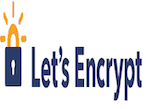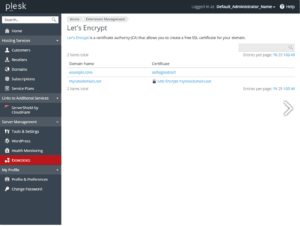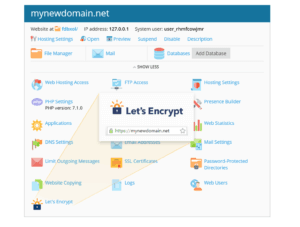 Piergiorgio Venuti
Piergiorgio Venuti
Certificati Let’s Encrypt gratuiti per tutti gli utenti Webhosting
Let’s Encrypt è una Certification Authority gratuita, automatizzata e open. L’obiettivo di Let’s Encrypt e del protocollo ACME è quello di rendere possibile la realizzazione di un server HTTPS e di ottenere automaticamente un certificato attendibile per i browser senza nessun intervento umano. Questo viene realizzato grazie all’esecuzione di un agent di gestione dei certificati installato sul web server.
Con il nostro server Webhosting basato sulla tecnologia Plesk puoi ottenere un certificato SSL gratis con Let’s Encrypt in modo da rendere sicure tutte le tue pagine web.
Il Let’s Encrypt Plesk plugin è installato di default su tutti gli account web hosting, ti è sufficiente abilitarlo se desideri utilizzare un certificato SSL per proteggere il tuo sito web.
Creare Certificati SSL con Let’s Encrypt
Per creare il tuo certificato SSL effettua l’accesso al tuo portale Webhosting, clicca sul dominio per il quale desideri creare il certificato SSl poi clicca sull’icona relativa come mostrato di seguito:
Se non hai ancora attivato il servizio Webhosting può accedere all’area demo Webgosting demo.
Screenshots
Customers
Twitter FEED
Recent activity
-
SecureOnlineDesktop
Estimated reading time: 6 minutes L'impatto crescente delle minacce informatiche, su sistemi operativi privati op… https://t.co/FimxTS4o9G
-
SecureOnlineDesktop
Estimated reading time: 6 minutes The growing impact of cyber threats, on private or corporate operating systems… https://t.co/y6G6RYA9n1
-
SecureOnlineDesktop
Tempo di lettura stimato: 6 minuti Today we are talking about the CTI update of our services. Data security is… https://t.co/YAZkn7iFqa
-
SecureOnlineDesktop
Estimated reading time: 6 minutes Il tema della sicurezza delle informazioni è di grande attualità in questo peri… https://t.co/tfve5Kzr09
-
SecureOnlineDesktop
Estimated reading time: 6 minutes The issue of information security is very topical in this historical period ch… https://t.co/TP8gvdRcrF
Newsletter
{subscription_form_2}© 2024 Cyberfero s.r.l. All Rights Reserved. Sede Legale: via Statuto 3 - 42121 Reggio Emilia (RE) – PEC [email protected] Cod. fiscale e P.IVA 03058120357 – R.E.A. 356650 Informativa Privacy - Certificazioni ISO












